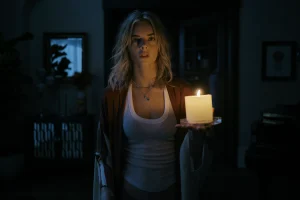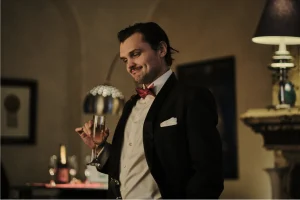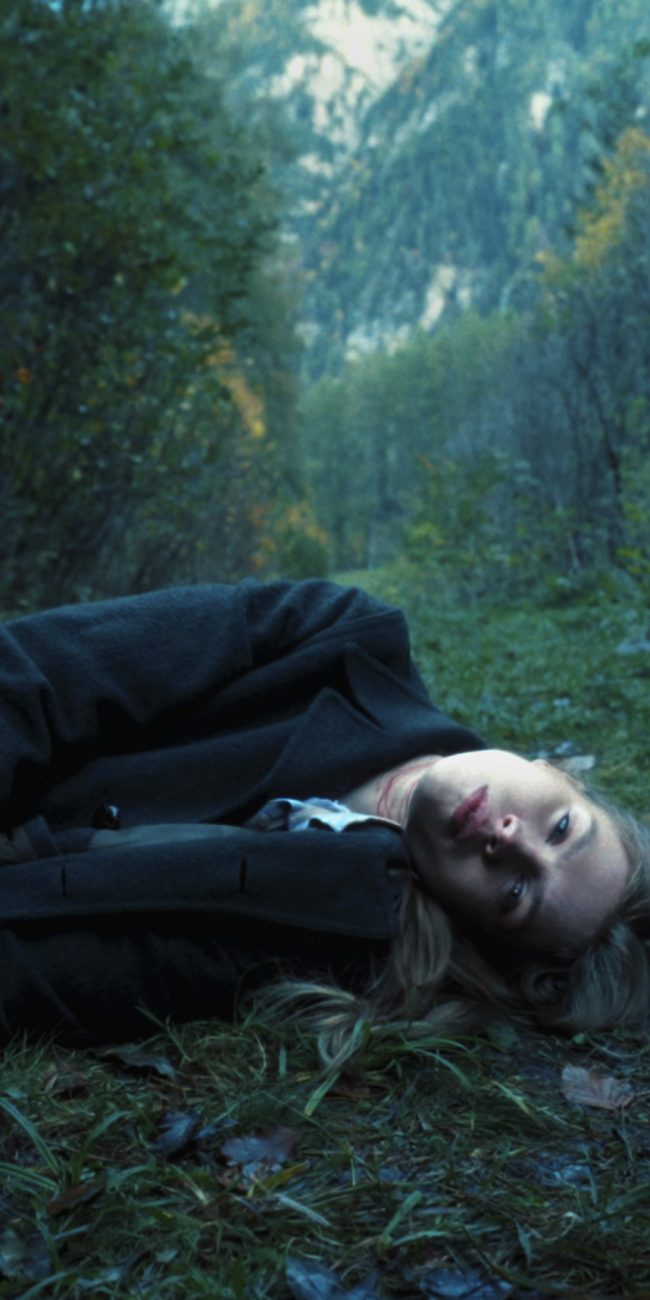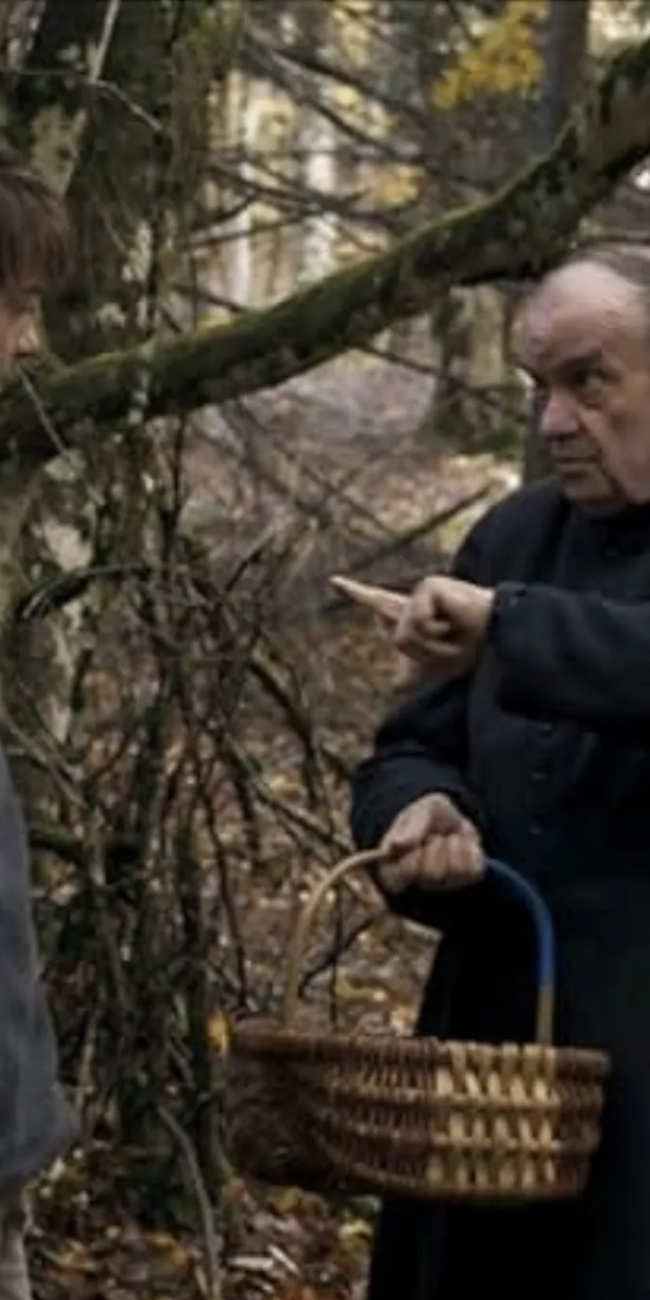A Conversation with Jimmy Warden & Samara Weaving (BORDERLINE)

Borderline is a fun thriller that follows a persistent stalker (Ray Nicholson) who invades the home of a ’90s pop superstar (Samara Weaving) with grand delusions of a wedding. Written and directed by Cocaine Bear writer Jimmy Warden, the film stars Samara Weaving (Ready or Not, Scream VI) as “Sofia” and Ray Nicholson (Smile 2) as her obsessed admirer “Paul Duerson”, with supporting performances from Eric Dane (Euphoria), Jimmie Fails (The Last Black Man in San Francisco), and Alba Baptista (Warrior Nun). Produced by Margot Robbie’s LuckyChap Entertainment, Borderline marks Warden’s directorial debut after his spec script landed on the Black List, blending cult thriller influences with dark comedy to create something unique. It was great to speak with Jimmy and Samara in the following conversation edited for length and clarity.
Hammer To Nail: Jimmy, you wrote this as a spec script that ended up on the Black List. Can you talk about how the movie went from there to the screen? And Samara, when you first read it, what was the moment you knew this was something special that Jimmy had to direct himself?
Jimmy Warden: the screenplay that was on the blacklist and the actual shooting script are totally different. When I was writing the spec, I was trying to have something that felt readable and splashy and digestible in a way that was also left of center. Then when you’re actually executing the vision, you try to throw all that stuff out and really hit the substance of what the movie is. I write in a way that’s easy for the reader. I write jokes and big print and that kind of stuff. But that doesn’t really matter when you’re actually making the film. You need to figure out a way to get all that energy on the screen.
Samara Weaving: Jimmy pitched me the idea before he wrote it and that’s when I was all in. I’ve been such a fan of his writing since I’ve met him, so it wasn’t a tough decision.
JW: I begged her to do it.
SW: Crying, wailing, bribery – all of it.
HTN: Jimmy, you said you wanted to create something reminiscent of cult classics from video stores. What cult films or thrillers specifically influenced this project? And how did you two discuss those references with the rest of the cast and crew?
JW: We talked about everything from Misery to Pretty Woman. I always saw it as this was a rom-com in Paul’s eyes (Ray Nicholson). That’s what the movie is. He believes that this is their love story. Then, giving Sam more references, we watched a lot of The King of Comedy over and over again, and that really informed the character.
SW: We watched The King of Comedy and I just loved Jerry Lewis’s performance. He was almost annoyed that he was kidnapped rather than terrified. That seemed to really fit Sofia’s personality. I just reacted to Ray like the audience rather than a terrified damsel in distress, which I wanted to avoid.
JW: The root of the character is based on this understanding of “I know people like you,” and we want to end in this place where we have some compassion for them. It’s a little harder if you’re running away screaming the entire time. We watched Madonna: Truth or Dare, The Bodyguard. It was fun preparing because we could do sort of anything.
SW: The producers were so great just letting you do your thing.
JW: There were points, because the script is pretty out there, where we were having budget conversations about what was cuttable. Moments that are in the movie that I think are memorable were on the chopping block for a while. It took reinforcements from a lot of the producers to be like, “No, you’re making this movie. You’re not setting out to make a down-the-middle home invasion movie. You want to make something a little more subversive.”

Samara Weaving in BORDERLINE
HTN: Jimmy, you mentioned having a shorthand with Samara on set from your marriage. Can you give us an example of how that translated? And Samara, how does that trust affect your performance choices?
SW: I think ultimately we just have respect for one another, so it made it really easy to work together. We had this shorthand, I remember there was one scene where I needed to give Ray a real death glare, and Jimmy was like, “Just look at him like you look at me sometimes when I don’t clean up after myself.”
JW: It was like, “wet towel on the floor.” That sort of thing. I think it’s easier because when you’re directing, the relationship between actor and director is pretty respectful. Sometimes we don’t have to go through that entire thing where I come up to Sam and I’m about to say something and she already knows. She’s like, “Don’t worry, I’ll get there.” Or the opposite, she’s like, “Don’t you think you want this reaction shot?” and I’m like, “Oh yeah,**sarcastically** I was totally thinking we’re gonna do that now.” That sort of thing just makes it easier and fun. It was especially fun because we were shooting during COVID, so your world is so small anyway. Coming home and actually being able to debrief or just totally distract each other from the day’s work was invaluable.
HTN: I really love this introductory sequence with the camcorders and the television set. I thought it was such a great way to introduce both of your characters. What was important to both of you here?
SW: You’d planned that shot for a while.
JW: What was important to me was a sense that no matter what, she always feels like she’s on camera or performing, even in the most intimate situations. Just trying to carry that thought through. Eventually she gets stripped naked, not literally, but she is in a position where she’s not necessarily performing. A lot of it is like she ends up going full circle. She has that line “just let him have it” at the end, which is like a performance in itself. It helps set the scene for what I thought her arc would be emotionally, and also her outlook on life.
HTN: Later we have this sequence where Jimmy’s character is questioning their relationship, saying that he’s a puzzle. It’s a hilarious moment and a lot of that is credited to Samara’s amazing facial expressions. What was your thinking going into this moment?
SW: I realized quickly that I was going to be the audience’s reaction to everyone, playing the comedic foil the whole time. Jimmy did such a great job being so vulnerable and emotional that I didn’t really have to act very much. I was just in it with him. Jimmy wrote it so brilliantly.
JW: I think it was about setting up the expectations for typical gender roles of what would be prescribed to a basketball player and a pop star, and just seeing the man in the situation wear his heart on his sleeve and say, “This was serious to me. I’m nothing but a name on a list to you,” after Robert Smith from The Cure. It all stemmed from her character and how we decided together that she was gonna play off of Ray once the home was actually invaded.

Ray Nicholson in BORDERLINE
HTN: Moments after that, Ray comes up behind Samara and embraces her as if it’s his wife who he hasn’t seen in a while. This is the first moment that Samara realizes the danger is real. What was your thinking going into this sequence? And Jimmy, at what point in the writing process did you pen this moment?
SW: I was just trying not to laugh. Ray is so funny and so weird, and he just lets loose and does something different every single time. I was just trying not to break the whole time.
JW: It’s hard because Ray is just so funny as a human being. In the writing process, I think I wrote that pretty early on. I write in order, scene by scene. In an earlier draft, it happens on the same night that the bodyguard is taken down. That first scene between Ray and Eric Dane was the first scene that I had written because it informed so much of who that character was. Cracking that character was probably the most important for the movie.
HTN: I would be regretful if I did not ask you about my favorite scene in the movie, this duet that leads into this incredible fight. From a writing perspective, what was the inception? And from directing and acting perspectives, what was important to both of you in the musical and fighting sequences?
JW: I knew that we were going to have the Penny character played by Alba Baptista come in and be the maid of honor, essentially, who is insane but is into music. The line that cracked that character for me was when Sophia says, “I didn’t write this,” at the beginning of the song, and Alba says, “I know, because this is good.” It made it funny to me that she didn’t like her as a pop star or singer at all, and then making her sing a song that isn’t hers, who would probably be a competitor for Grammys and stuff like that. Then turning it into this fight that just goes on and on was always the anchor for the movie.
SW: It puts two of your favorite genres together. Jimmy loves musicals and a good horror movie, so you got to do both.
JW: I was like, “How do we squeeze a couple musical numbers in?”
SW: Maybe you should direct a musical next.
HTN: The house is obviously a major element of the story and Samara’s character. How did you find that location? And Samara, how did that impact your performance?
SW: It’s such a massive house and she’s just alone in it. There’s something kind of lonely and weird about that. She’s surrounded by this grandeur, but why do you need such a big house if you never have anyone over? You don’t even want anyone to stay over.
JW: If I’m being honest, that was the only one that we could afford and get. It turned out that we could park our work trucks there and live in the house for two weeks, which was a blast. That place was gigantic.
SW: It was huge and there were horses everywhere.
HTN: I love this last shot of Ray. I think it’s the perfect conclusion to the film. When did that come to you in the writing process?
JW: That did not come to me in the writing process. The only thing that I did there was keep the camera rolling. Ray just pulled that out of thin air. I told him before that, “this is your movie, and this is how we’re ending the movie.” Our walkies didn’t work, we were in the car ahead of him, and we just rolled the camera. He didn’t know when we were going to cut. I just said, “Stay in character.” You see the entire arc of the character on his face play out from beginning to end in that last shot. I can’t speak highly enough of him as an actor.
– Jack Schenker (@YUNGOCUPOTIS)











